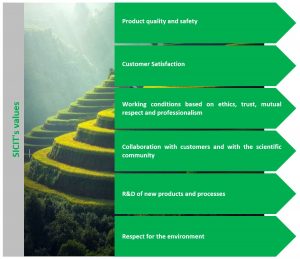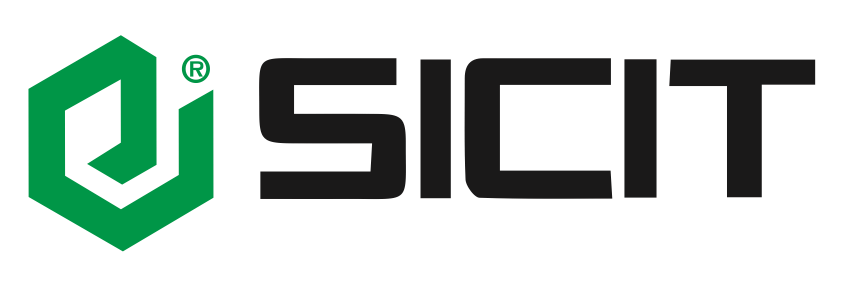Vision and value
The three pillars of SICIT’s vision:
1 – SICIT is the world’s major producer of Hydrolyzed Protein of animal origin
Hydrolyzed protein obtained is then sold in the agricultural sector as biostimulants and in the industrial sector as retarders for plaster, supplying the most important players in the agronomic, agrochemical and industrial sectors.
2 – Italian excellence of the green and circular economy
SICIT withdraws and transforms toxic and harmful residues into products with high added value, totally biodegradable, without risks to public health and the environment, limiting waste production to almost zero.
3 – Higher investment in R&D
In addition to continuous and important investments in Research and Development, SICIT has three internal laboratories: a quality control laboratory, a chemical laboratory for product and process Research and Development and an agronomic laboratory for Research and Development of new products for agriculture.
“SICIT wants to be the ideal partner, supporting its clients in the development of a complete range of amino acid and peptide based fertilizers”
It is not capital that makes a company grows, but all winning ideas and a flexible organizational structure capable of adapting quickly to a market’s context characterized by uncertainties and turbulence.

SICIT and its subsidiary SICIT Chemitech adopt an Organisational, Management and Control Model, in compliance with the provisions of Legislative Decree no. 231/01*. It has appointed its own monocratic Supervisory Board, composed of an external body that meets the requirements of professionalism, honour and independence and is able to ensure the necessary continuity of action. The Supervisory Board, by 30 April each year, reports on its activities, which it presents to the Board of Directors and the Board of Statutory Auditors.
The adoption of the 231 Model took place at the end of a risk assessment project relating to the types of offences established in Legislative Decree 231. Model 231 is aimed at preventing the commission of particular types of offences which criminal liability of active subjects and administrative liability of the company. The Board of Directors constantly updates this Model.
SICIT and SICIT Chemitech will provide dedicated training on the contents of the 231 Model and its impact on its employees and collaborators.
The Group conducts its internal operating activities and business relations according to principles of ethics and integrity. In 2019, the Board of Directors of SICIT approved an updated version of the Code of Ethics that identifies the responsibilities and ethical commitments of the Company towards its internal and external stakeholders. The Code of Ethics is addressed to corporate bodies, management, employees, external collaborators, business partners, suppliers and all those who have relations with the Company.
The Company will:
- guarantee maximum circulation of the Code among its personnel and third parties involved in relations with the Company;
- guarantee that the Code is kept updated, in relation to changes in company needs and laws in force;
- guarantee every possible cognitive and clarification instrument for Code regulation interpretation and implementation;
- carry out verifications on every piece of information on Code violation, evaluating the facts and – in the case of ascertained violation – implementing suitable penalties.
The Code of Ethics is published on the company Website. A paper copy is distributed to all personnel and collaborators that work for the Company. To ensure that the Code of Ethics is being understood, SICIT has prepared an information plan that guarantees its full divulgation and explanation.
The Whistleblowing Procedure is designed to correctly manage the reporting of any violations and irregularities concerning the Code of Ethics and Model 231.
Employees must inform their direct superior about any violations or suspected violations; in cases where a violation was signalled but the result was not effective or opportune, employees must inform the CEO, or the Supervisory Body. The latter is required to promptly check the information transmitted and, once the report has been verified as well founded, to submit the case to the competent corporate department for the application of any disciplinary sanctions or for the activation of contractual termination mechanisms.
For external subjects, a communication channel has been set up by the e-mail address odv@sicitgroup.it, to which only members of the Supervisory Board may access. Alternatively, reports may be sent writing directly to the Supervisory Board at the address Supervisory Board, c/o SICIT Group S.p.A. – Via Del Lavoro no. 114, Arzignano (VI).
This procedure is designed to ensure the confidentiality of the reporter and the confidentiality of the information received, as well as its validity.
No grievances as of 31 December 2019 has been sent to the Supervisory Board inbox.
In carrying out its activities, SICIT is committed to the fight against corruption and the prevention of risks related to illegal practices. In this context, SICIT ensures that business is conducted in line with fairness, excluding any form of corruption or favouritism, completeness and transparency of information and legitimacy.
Risk monitoring and management is an integral part of SICIT’s business model. Risk exposure is managed through a detailed risk analysis. The Risk Assessment Document, approved by the Board of Directors in 2020, provides an initial analysis of the main risk categories and illustrates response strategies to mitigate the risks identified. The main risk categories identified are:
- External risks related to the external environment that may impact on the Group’s ability to achieve its strategic and operational objectives
- Business risks related to activities and critical aspects of the business
- Risks related to the efficiency and effectiveness of business operating processes with impact on Group performance
- Risks related to human resources management and the effectiveness of the organisational structure
- Risks related to financial planning processes and financial reporting activities, management of financial and insurance instruments
- Risks related to availability, accessibility, integrity of information infrastructures and systems and data security
- Risks related to compliance with national and international laws and regulations and Group policies.
* Foreign subsidiaries of SICIT Group are excluded.
